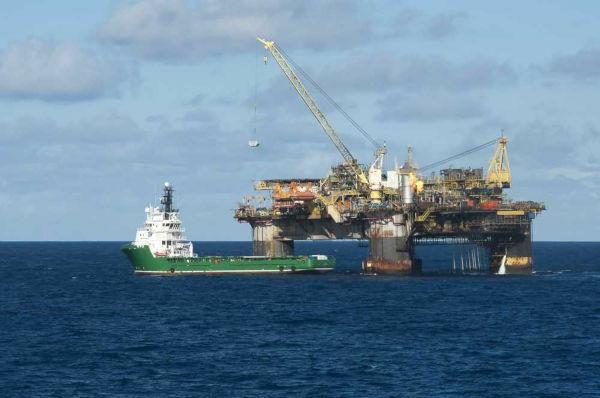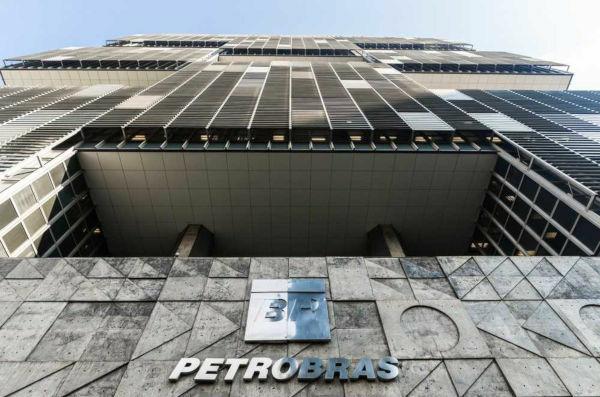O pre-salt found in Brazil is a large oil and natural gas reserve found in deep waters, more than 7,000 meters below the sea level, under an extensive layer of salt that reaches up to two thousand meters thick, which makes its exploration. This Brazilian reserve is located in a coastal strip of approximately 800 kilometers in length that comprises the states of Espírito Santo and Santa Catarina. O Petroleum found in this region is of high quality and is located in an area of three sedimentary basins:
1. Santos Basin
2. Campos Basin
3. Espírito Santo Basin
This region is called pre-salt due to a geological time scale, that is, its formation period. The temperatures in the places where this oil reserve is located are high, between 80º C and 100º C. As it is an area under high pressure and high temperatures, the compositions of the rocks end up changing, making the oil extraction process more difficult, which requires the use of advanced technologies.
Know more: oil extraction
Location and depth of pre-salt in Brazil
The pre-salt in Brazil corresponds to a region where, millions of years ago, there was an accumulation of organic matter, as a result of the distance between the African and American continents. This triggered the formation of a layer of salt approximately two thousand meters thick, deposited under the accumulated organic matter.
Located on the coast that comprises the states of Espírito Santo and Santa Catarina, this extensive layer is about 800 kilometers long and 200 kilometers wide. This pre-salt layer is more than 7,000 meters below sea level, covering the sedimentary basins of Campos, Santos and Espírito Santo. Below it is a large oil reserve.
Who discovered pre-salt in Brazil?
In 2006, Petrobras announced the existence of a large oil field stored under a thick layer of salt, off the coast of Rio de Janeiro. This discovery was the result of the cooperation process between Petrobras and foreign companies that aimed to explore oil. Over many years, the state-owned company developed technologies that could guarantee Brazil's self-sufficiency in relation to oil reserves, as Brazil has historically depended on oil imports. Thus, the researches left the terrestrial fields and migrated to deep waters.
The socioeconomic context at the time the pre-salt was discovered in Brazil pointed to a relevant Brazilian economic expansion, added to the increase in world demand for oil. During this period, Petrobras was involved in political scandals, which ended up impacting investments in the pre-salt. However, the discovery of this reserve was not unattractive, thanks to its immense production potential. So, in 2010, the Petrobras started, in fact, the process of oil extraction in the Jubarte field, located in the Campos Basin, in Espírito Santo, giving rise to a new perspective for the Brazilian economy.
According to data provided by Petrobras, oil production, which in 2010 was approximately 41,000 barrels per day, reached the mark of 1 million barrels per day in 2016. There are a total of 52 wells being drilled in an increasingly shorter period, as a result of advances in technologies and projects. In May 2018, Petrobras announced that oil production reached the mark of 2.07 million barrels per day.
Read too: Petrobras

Oil exploration platform in the Campos Basin.
Pre-salt exploration
In the pre-salt layer in Brazil, several fields were discovered for oil exploration, which are divided between the Santos, Campos and Espírito Santo Basins. In the Santos Basin and in the Espírito Santo Basin, according to the Ministry of Mines and Energy, there are the main fields, such as the Tupi, currently known as the Lula field, the Iara and the Parque das Whales. In the region where the Santos and Espírito Santo Basins extend, Petrobras drilled 31 wells, with the Santos Basin being the one with the most productive wells. Of the ten wells with the best daily flow, nine are in this area. Currently, the most productive field is the field of Squid, located in the Santos Basin, with an average production of 36,000 barrels of oil per day.
Petrobras and the consortium companies are currently producing, on average, 2.1 million barrels of oil in one day. According to the state-owned company, this production will double by 2020, reaching around 4 million barrels per day. According to the director of the Energy Research Company, José Mauro Ferreira, by the year 2026, Brazil could become one of the five largest oil exporters in the world.

Petrobras, the biggest oil company in Brazil.**
Current situation of pre-salt in Brazil
Oil demand is one of the main causes of conflicts and wars in the world. On the one hand, there are countries that produce oil and hold large reserves, but which have a reduced market, limited technologies and little capital, such as countries in the Middle East. At the same time, there are countries that consume but have little or no reserves. These, however, have large markets, a lot of capital and advanced technologies and need to buy oil from large producers.
In this context, the discovery of the pre-salt in Brazil places the country in a privileged situation, as it attracts greater visibility in the investor market. Pre-salt exploration means a new development path for Brazil, as the activity encourages investments by national and foreign companies, boosts the production of technology, promotes greater professional training and generates opportunities for job. As a result of this interest, which represents large investments in the country's economy, the government stipulated three regimes, through contracts, for oil exploration:
→ Concession: guarantees exclusive rights for the production, exploration and sale of oil in a given period.
→ Production sharing: the Union holds the oil and negotiates the distribution of profits among investors.
→ Onerous assignment: the State gives Petrobras the right to explore oil in some areas.
Through the production sharing regime, Brazil foresees greater control over oil exploration and, thus, seeks to obtain greater economic and strategic advantage. A great example of interest in global investments are the auctions that take place in the pre-salt areas in Brazil. In 2013, the first auction took place in the Libra area, one of the pre-salt extraction fields, which was won by the consortiums Petrobras, Shell, Total and Cnooc and CNPC (National Petroleum Corporation of the China).
According to Petrobras' Business and Management Plan, between 2014 and 2018 they will be invested in the around 220 billion dollars in the oil sector, 153 billion of which are invested directly in the exploration of the pre-salt. The Brazilian Petroleum Institute (IBP) forecasts that the investment in the pre-salt will reach 1.7 trillion dollars over the next 30 years.
What is the importance of pre-salt for Brazil?
The discovery of the pre-salt represented for Brazil self-sufficiency in relation to oil, since, historically, the country has always needed to import it. According to the IBP, by 2035, Brazil will stop importing and will become an energy exporter. There is an estimate that oil production will increase around 109%, making Brazil the largest oil producer in South America.
In addition to guaranteeing Brazil's self-sufficiency, the discovery of the pre-salt also guarantees that the country will protect itself in any energy crisis. This takes Brazil to a privileged position economically and geopolitically, as it strengthens the economy, as a result of large investments, generates new jobs and expands advances technological.
_____________________
*Image credits: Gilberto Mesquita / Shutterstock
**Image credits: Alexander Vorobev / Shutterstock
by Rafaela Sousa
Graduated in Geography
